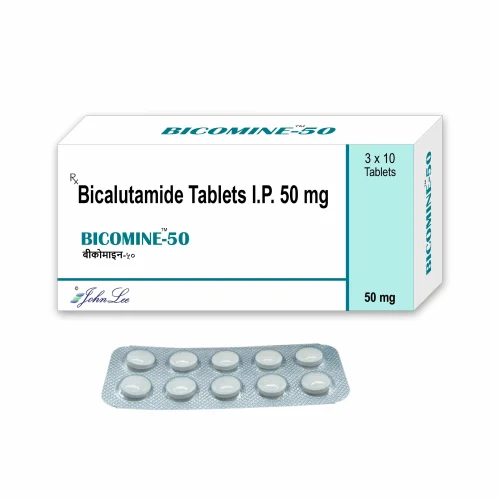Bicalutamide Tablet 50 mg is a medication primarily used in the treatment of prostate cancer. Here’s a breakdown of key information:
What it is:
- Bicalutamide is a non-steroidal anti-androgen.
- It works by blocking the effects of male hormones like testosterone on the prostate gland. Prostate cancer often relies on these hormones to grow, so blocking their action helps slow down or stop cancer progression.
- It is often prescribed in combination with a luteinizing hormone-releasing hormone (LHRH) analog (which reduces testosterone production by the testicles) or surgical castration.
Uses:
- Advanced prostate cancer: Specifically, Stage D2 metastatic carcinoma of the prostate, in combination with an LHRH analog or surgical castration.
How it works (Mechanism of Action):
- Bicalutamide acts as a selective antagonist of the androgen receptor (AR).
- It binds to the androgen receptor, preventing androgens (like testosterone and dihydrotestosterone) from binding and activating it. This inhibits the growth-stimulating effect of these hormones on normal and malignant prostate tissue.
Dosage:
- For the treatment of prostate cancer in combination with an LHRH analog, the recommended dose is 50 mg orally once daily, usually taken at the same time each day (morning or evening), with or without food.
- Treatment with bicalutamide 50 mg should ideally be started at the same time as, or at least 3 days before, commencing treatment with an LHRH analog.
Important Considerations & Side Effects:
- Not for use in women or children: Bicalutamide can cause harm to an unborn baby. Men taking bicalutamide should use effective birth control during treatment and for a period after stopping it (typically 130 days).
- Liver function monitoring: Severe hepatic injury and fatal hepatic failure have been observed with bicalutamide. Your doctor will likely monitor your liver function with blood tests before and during treatment. Inform your doctor immediately if you notice symptoms like yellowing of the skin or eyes, dark urine, or stomach pain.
- Common side effects can include:
- Hot flashes
- Breast tenderness and enlargement (gynecomastia)
- Fatigue, weakness
- Nausea, constipation, diarrhea, abdominal pain
- Swelling of the ankles, feet, or hands (peripheral edema)
- Decreased libido, erectile dysfunction
- Less common but serious side effects can include:
- Liver toxicity (as mentioned above)
- Lung disease
- Sensitivity to light (photosensitivity)
- Hemorrhage (especially with concomitant use of coumarin anticoagulants like warfarin)
- Drug Interactions: Bicalutamide can interact with other medications, particularly those metabolized by CYP3A4. It’s crucial to inform your doctor about all medications you are taking.
- Blood glucose monitoring: LHRH agonists (often used with bicalutamide) can affect glucose tolerance, so blood glucose monitoring may be recommended for diabetic patients.

